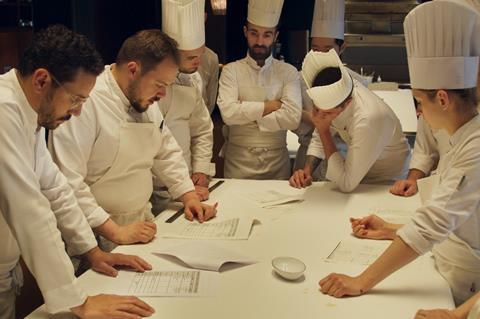Frederick Wiseman takes time to savour his subject in this absorbing four-hour documentary about a French restaurant

Dir: Frederick Wiseman. US. 2024. 240mins
Does Frederick Wiseman have a to-do list of institutions he still means to get around to? The latest to benefit from the 93-year-old filmmaker’s documentary gaze is the Troisgros family, who run a venerable gourmet restaurant north-west of Lyons. When it was first awarded its prestigious third Michelin star in 1968, Wiseman had only recently finished his first ‘direct cinema’ documentary, Titicut Follies, charting life in a Massachusetts hospital for the criminally insane. Both restaurant and filmmaker have grown together over the intervening 55 years. Menus-Plaisirs – Les Troisgros (the first part of the name derives from the department of the French royal court dedicated to organiding events and entertainments) is a perfect example of Wiseman’s more mellow late period work, one that has seen an increasing interest in cultural institutions including those of his second homeland, France.
An absorbing film, a forest full of trails for viewers to wander in
With a running time of four hours, Menus-Plaisirs – Les Troisgros is a marathon, even by Wiseman’s leisurely standards. But it is an absorbing film, a forest full of trails for viewers to wander in. It would be foolhardy to suggest that Wiseman’s latest will reach out much beyond further festival play and ultra-specialist outlets after its Venice debut. But its accessible food and wine theme will at least place it at the wider end of the niche market for un-narrated four-hour docs. This is a film you will find yourself taking recipe tips from, perhaps even jotting down the names of wine producers.
As always, there is no voice-over, no added contextualisation of any kind except for a single end title. As always, we are made to work. Even the most observant viewer would be unable to write a halfway decent Wikipedia entry on the Troisgros family and their culinary mini-empire before that end title comes along to help out. But Wiseman in not in the Wikipedia business. What Menus-Plaisirs – Les Troisgros does offer those patient enough to surrender to its circular rhythms is a series of reflections on the way a place dedicated to the exaltation of humankind’s need for sustenance and desire for intoxication becomes a kind of petri dish, in which the human and the natural world interact in interesting ways.
Take the conversation about fish and seafood supplies that takes place near the beginning, in the dining room of the more modest of the family’s restaurants in the market town of Roanne. It starts with a problem –the family is already taking all the crayfish their fish wholesaler can supply – and gradually works towards a solution, one that has to do with seasonality and sustainability (why not use local freshwater fish, and what about those two huge pikes that have been in the freezer since Christmas?).
At the same time, we are still working out the identity of these three guys who are talking so intensely – they are related, we know, and they all seem to be chefs, but it is only in the course of the conversation that we realise that the older, Michel, is the father of the other two, self-confident Cesar and his more guarded brother, Leo. Their three-way dynamic is complicated: there is some friction that comes out in dad’s veto of Leo’s use of almond sauce in a recipe, one that seems to be about much more than almond sauce.
Yet this is also a fascinating exchange between three people who live, think, eat and breathe food, and who discuss its transformation with informed passion. In the next three and a half hours, we will watch food being prepped at Trosgrois – Le Bois Sans Feuilles, the chic rural premises that since 2017 have housed the family’s gourmet restaurant, with its floor to ceiling country views. We will see waitstaff in white gloves making millimetric adjustments to the cutlery, watch a happy troupe of young chefs on a country jaunt to pick elderflowers, hear allergies and intolerances recited by the maître to kitchen staff whose work, it is suggested, is so much more complex than it used to be, as much about removal and substitution as it is about assembling dishes.
We see head chef Cesar and his dad, head chef Michel (yes, that’s clearly another problem), visiting suppliers to see their grass-fed cattle, or the legumes that grow in between their vine rows. And we see a range of clients enjoying what is the culinary equivalent of an evening at the theatre, crowned by chef/philosopher Michel’s appearance at their table for a chat. Many of those prepared to shell out more than €500 a head for a meal with wine pairing seem refreshingly normal; for some reason (mischievous editing on Wiseman’s part, or universal truth?) it is the English speakers that adhere most closely to the pretentious image of the food and wine snob. “The tannins are so dusty and distributed – the grip is still there,” drawls one specimen as he swirls his glass.
What emerges most strongly from Wiseman’s sensitive documentary – getting close to his fiftieth, depending on how you count – is the quiet optimism of its study of a human ecosystem based on a search for perfection. Nowhere does this come through more strongly than in a scene in which a busy Michel takes time out from supervising his kitchen staff to sit down with a chef de partie who has got his prep wrong to patiently leaf through those two bibles of French cuisine, Escoffier and Larousse, and show him where the error lay.
Production company: Zipporah Films Inc
International sales: The Party Films Sales, sales@thepartysales.com
Producers: Frederick Wiseman, Karen Konicek, Olivier Giel
Cinematography: Jaes Bishop
Editing: Frederick Wiseman















![[L-R]: Amanda Villavieja, Laia Casanovas, Yasmina Praderas](https://d1nslcd7m2225b.cloudfront.net/Pictures/274x183/6/4/1/1471641_pxl_20251224_103354743_618426_crop.jpg)









No comments yet